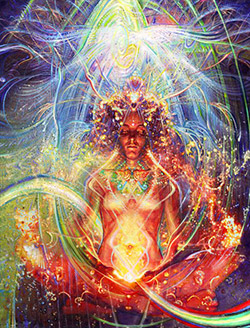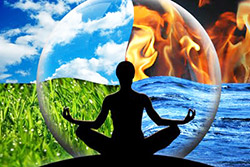Man’s ultimate purpose is wisdom (I)
by Gregorian Bivolaru, yoga teacher
What is wisdom? There are many sides to this.
 „Wisdom is a manifestation of the blissful void”, said Job. “It is a complete and profound perspective on things”, said Proust. “Wise is the one who truly knows himself”, said Lao Tze. “The one who can recognize God’s wisdom with great ease is wise”, said another sage. And yogis say that wisdom is benefic love, common sense and the love for God’s truth.
„Wisdom is a manifestation of the blissful void”, said Job. “It is a complete and profound perspective on things”, said Proust. “Wise is the one who truly knows himself”, said Lao Tze. “The one who can recognize God’s wisdom with great ease is wise”, said another sage. And yogis say that wisdom is benefic love, common sense and the love for God’s truth.
Wisdom is a supreme state of inner balance (psychic, mental, spiritual), blissful serenity and self contentment, a revelation of the immortal divine spirit (ATMAN), of complete accord between thought and deed, a state that can be reached by those human beings who have activated their SAHASRARA chakra perfectly. One can reach the supreme state of wisdom through an extended spiritual experience, deepened by reflection and considerably accelerated through the constant and correct practice of the higher levels of the yoga system.
Wisdom involves an intuitive, integrated, general conception on the world, on man, on his place in the universe and on the existing reality of God.
Wisdom involves the knowledge of the moral values of divine good, ultimate truth, perfect beauty, purity, love, respect for oneself and for others, unconditional love of God, as well as an unshakable faith which is in accordance with these principles and values.
Wisdom is an expression of profound knowledge of self and self control, an expression of a permanent way of guiding oneself in life in accordance to the divine universal principles which stand for common sense and creative intelligence.
Genuine wisdom reflects complete respect towards the laws of nature, as they were created by God’s perfect intelligence.
Always opens oneself towards life’s lessons
 “The Wise man” – according to a Romanian saying – “does things according to what’s possible (permanently obeys the divine laws) and not according to his will alone.” The wise man tirelessly strives to reach up to the great universal, divine values that have been revealed by mankind’s activity for millennia.
“The Wise man” – according to a Romanian saying – “does things according to what’s possible (permanently obeys the divine laws) and not according to his will alone.” The wise man tirelessly strives to reach up to the great universal, divine values that have been revealed by mankind’s activity for millennia.
He understands and tries, in unison with the supreme will, to bring his contribution, which is dependant of his powers (his powers being extremely heightened upon reaching the state of wisdom), to the spiritual and moral deliverance of mankind, through actions or teachings (which are a manifestation of harmony and supreme divine intelligence) shared with other people, by educating the children in the spirit of respecting the great divine values.
The wise man is drastic with himself and indulgent and loving with the others when they deserve it; he builds his life gradually, always puts his rich life experience and the fruit of his profound meditation in line with the teachings and revelations he received both from God, and from other people that he learns from, either directly or through their deeds; the wise man believes that THE ULTIMATE TRUTH IS EVERYTHING and that’s why he doesn’t cling to a rigid and definitive way of life. He is just like a child, learning something new all the time, from everyone and everything around him, always ready to correct himself if he makes a mistake, either from his own advice or from other’s advice; he unites the full stability of a spiritual and moral position with the perceptiveness towards authentic, divine values; he knows his true position towards himself and others, while always being on the guard against the ego or some form of theatrical humiliation.
It brings divine happiness into the soul
 Wisdom, the fruit of a superior, ultimate and general knowledge on the world, inspired by God, always leads to benefic actions, to a harmonious practical conduct which is divinely integrated and it makes the founding and the explaining of this conduct, according to the divine principles.
Wisdom, the fruit of a superior, ultimate and general knowledge on the world, inspired by God, always leads to benefic actions, to a harmonious practical conduct which is divinely integrated and it makes the founding and the explaining of this conduct, according to the divine principles.
Wisdom excludes the isolation from people without any real reason and hermitage, the eccentric choice of living outside the community, as well as superficial and casual sociability.
Therefore, wisdom involves some honest and correct relations of affectionate friendship and love, detached from selfishness towards people, relations which are naturally modulated according to the degree of personal intimacy. This also excludes both harsh language and excessive familiarity, with the exception when these types of behavior are required.
Seen as a general position of dedication towards higher life, towards the Divine, wisdom is a profoundly integrated and transfiguring state. Even if it does not consist of a rigid set of rules of conduit, wisdom still consists of an entire string of harmonious, divine, superior practical attitudes and it is doubled by concrete benefic actions which are, above all, destined to maintain vital, mental and spiritual balance.
 This allows us to always keep a euphoric state of serenity and peace with ourselves, which often causes the induction of the divine imperishable happiness (ECSTASY), (a state which is specific to reaching the state of wisdom). All the great spiritual paths of humanity, yoga being one of them, have wisely lead those who knew how to understand them and, most importantly, they knew how to practically make use of them.
This allows us to always keep a euphoric state of serenity and peace with ourselves, which often causes the induction of the divine imperishable happiness (ECSTASY), (a state which is specific to reaching the state of wisdom). All the great spiritual paths of humanity, yoga being one of them, have wisely lead those who knew how to understand them and, most importantly, they knew how to practically make use of them.
Religions, yoga, divine principles of practical morals, authentic philosophies, great, lasting, brilliant, literary and artistic works of art, scientific, general, objective concepts of GOD, the world, life and man, all these have been direct or indirect incentives to wisdom, and sometimes they more or less represent an explicit formulation of a certain form of wisdom. For better illustrating this notion, we won’t be giving any names of authors or any reference works of art; any reference of this kind would be setting limits; in this respect, we should only refer to human spirituality as a whole, the fruit of the divine spiritual activity of all peoples and ages.
Wisdom, when it is an innate quality, having already been earned through consistent effort in previous incarnations (for example, the successful practice of yoga by reaching the highest spiritual peaks, in a previous life), is a gift that is already present in human beings, from the moment they are born. In other cases, wisdom is the result of personal and spiritual experiences attained through the practice of yoga, during this life.
It presents with complete balance of personality
 Wisdom is the superior ability of understanding existing aspects, consisting of an essential, profound knowledge of reality, a rich spiritual experience, complete balance between desire and possibility, as well as an intimate form of communication with God, from which the euphoric serenity and self contentment arise; wisdom is intelligence plus common sense when it comes to conduct and to the just and objective assessment of events and reality. Wisdom can be attained following some rich spiritual experiences (which can be easily accessed through different yoga techniques) and is opposed to any kind of excess of any kind.
Wisdom is the superior ability of understanding existing aspects, consisting of an essential, profound knowledge of reality, a rich spiritual experience, complete balance between desire and possibility, as well as an intimate form of communication with God, from which the euphoric serenity and self contentment arise; wisdom is intelligence plus common sense when it comes to conduct and to the just and objective assessment of events and reality. Wisdom can be attained following some rich spiritual experiences (which can be easily accessed through different yoga techniques) and is opposed to any kind of excess of any kind.
Wisdom involves not only a profound form of self-knowledge, knowledge of God and the world, an authentic philosophy and life experience, but also a perfect ability of self-control which leads to a profound transformation of one’s own being, as a creative means of influencing the surrounding world and the people we interact with.
Through correct and persevering practice of yoga, wisdom will no longer be something which is available only to the elderly, who are already aware of the consequences of all sort of actions and have a great sense of relativity. Some say: “Life makes you wiser”, but still, wisdom can also be developed in young yogis, if they are willing to learn from their own spiritual experience and from others’ as well, if they can assess the facts from a divine harmonious perspective, which is complex, superior, correlated and intuitively-rational.
 Wisdom is an essential virtue, both gnoseological and moral, involved in the very finality of the yoga system, which reunites the inner revelation of the existence of God, the theoretical knowledge of the fundamental laws of the Macrocosmos (which express perfect intelligence harmoniously reflected by God in manifestation) and the realization of any action, corresponding to this superior threshold.
Wisdom is an essential virtue, both gnoseological and moral, involved in the very finality of the yoga system, which reunites the inner revelation of the existence of God, the theoretical knowledge of the fundamental laws of the Macrocosmos (which express perfect intelligence harmoniously reflected by God in manifestation) and the realization of any action, corresponding to this superior threshold.
In ancient times, the idea of wisdom meant a complete “balance” of personality, moderation in everything, a perfect ability to master and sublimate passion with the purpose of superior, rational knowledge, man’s reconciliation with the world, euphoric spiritual serenity, the absolute experience, in unison with God’s will in manifestation. The Stoics and the epicures would define it as an absence of suffering, a lack of inferior passion (“aponia”, “apathia”) or a lack of restlessness, negative emotion (“ataraxia”), adiaphoria”, etc.
This article was taken from the yogamagazin website
You can read here the second part of this article
yogaesoteric
november 2014


